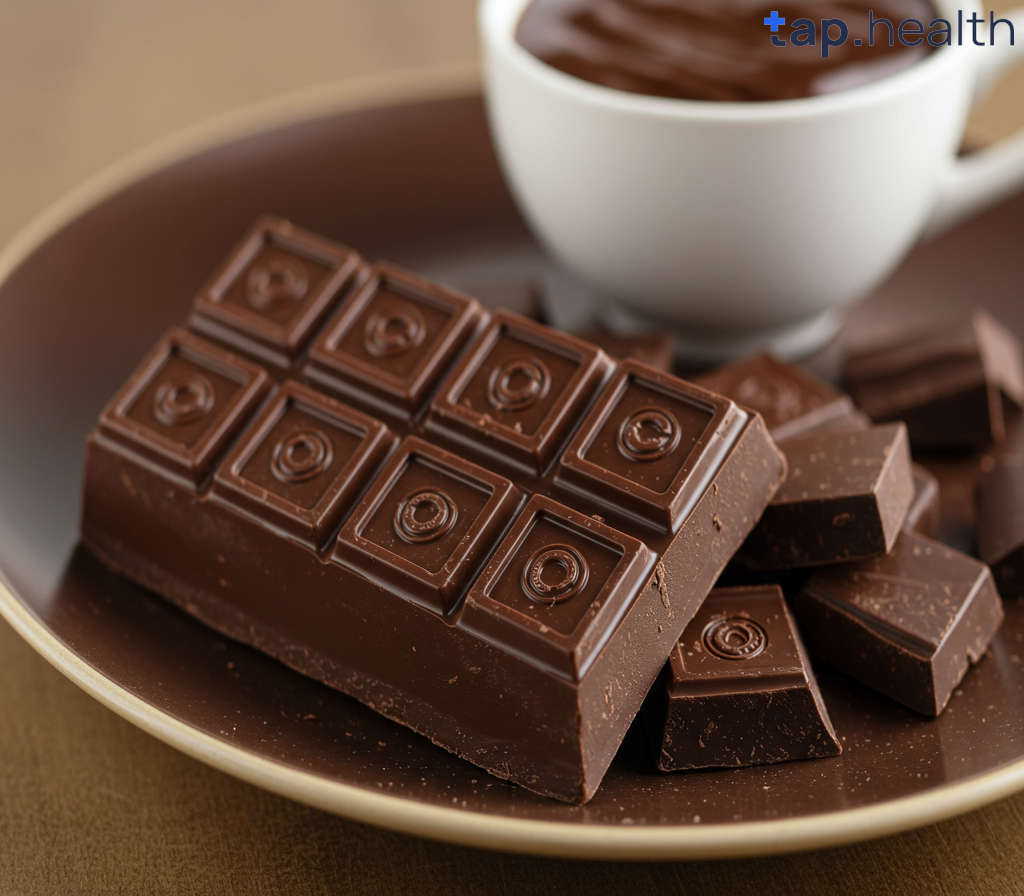If you or someone you love has diabetes, you might be wondering:
👉 “Can I still enjoy chocolate?”
And more specifically:
👉 “Is dark chocolate good for diabetic patients?”
The answer may surprise you!
In this article, we’ll explain everything you need to know about dark chocolate and diabetes — in simple terms anyone can understand.
We’ll look at what makes dark chocolate different from regular chocolate, how it affects blood sugar, and whether it can actually be part of a healthy diet for people with diabetes.
Let’s get started.
What is Diabetes?
Diabetes is a condition where your body can’t control the amount of sugar (glucose) in your blood. There are two main types:
- Type 1 Diabetes : Usually starts in childhood. The body doesn’t make insulin.
- Type 2 Diabetes : More common in adults. The body doesn’t use insulin well.
People with diabetes need to watch their diet closely, especially when it comes to carbs and sugars, because these can raise blood sugar levels quickly.
So, choosing the right kind of foods is very important.
Which brings us back to our question:
👉 Is dark chocolate good for diabetic patients?
Let’s find out.
What is Dark Chocolate?
Dark chocolate is made from cocoa solids , cocoa butter , and usually some sugar . Unlike milk chocolate, it contains less milk and less sugar .
The more cocoa it has, the darker it is. You’ll often see labels like:
- 70% cocoa
- 85% cocoa
- 90% cocoa or higher
These numbers tell you how much of the chocolate is made from cocoa — the rest is mostly sugar and fat.
Now, here’s the key point:
👉 The darker the chocolate, the less sugar it usually has.
That’s why dark chocolate is often considered a better option than regular chocolate — especially for diabetics.
Nutritional Value of Dark Chocolate
Here’s a quick look at the nutrition facts per 1 ounce (about 28 grams) of dark chocolate with 70–85% cocoa :
| Nutrient | Amount |
|---|---|
| Calories | ~170 kcal |
| Carbohydrates | ~12 g |
| Sugars | ~7 g |
| Fiber | ~3 g |
| Protein | ~2 g |
| Fat | ~12 g |
Compared to regular milk chocolate, which can have up to 24g of sugar per ounce , dark chocolate looks much better.
Also, it has fiber , which helps slow down sugar absorption, and healthy fats , which keep you full longer.
So far, so good.
Does Dark Chocolate Raise Blood Sugar?
This is the big question.
👉 Does dark chocolate raise blood sugar?
Yes, but not as fast or as high as regular chocolate.
Because dark chocolate has less sugar and more fiber , it causes a slower and smaller rise in blood sugar compared to milk or white chocolate.
Also, the flavonoids found in dark chocolate (plant-based nutrients) may help improve insulin sensitivity , which is great for people with Type 2 diabetes.
However, that doesn’t mean you can eat it without limits. Even dark chocolate has carbs and calories , and too much can still affect your blood sugar and weight.
So, in short:
✅ Dark chocolate does not spike blood sugar quickly
❌ But eating too much can still raise blood sugar over time
Pros of Eating Dark Chocolate for Diabetics
Here are the main benefits of dark chocolate for people with diabetes:
1. Less Sugar Than Regular Chocolate
Dark chocolate usually has less added sugar, making it safer for blood sugar levels.
2. Contains Antioxidants
Dark chocolate is rich in antioxidants like flavonoids, which fight inflammation and may improve heart health.
3. May Improve Insulin Sensitivity
Some studies suggest that the flavonoids in dark chocolate may help the body use insulin better.
4. Slows Down Sugar Absorption
Thanks to its fiber content, dark chocolate slows digestion and prevents sharp blood sugar spikes.
5. Helps With Cravings
Sometimes, just a small piece of dark chocolate can satisfy a sweet tooth without going overboard.
Cons of Eating Dark Chocolate for Diabetics
Even though dark chocolate has benefits, there are some downsides too:
1. Still Contains Sugar
Even dark chocolate has some sugar. So it’s not “free” food for diabetics.
2. High in Calories
Too much dark chocolate can lead to weight gain, which makes diabetes harder to manage.
3. Not All Dark Chocolates Are Equal
Some brands add extra sugar or milk to make it taste sweeter. Always check the label.
4. May Cause Digestive Issues
Dark chocolate contains caffeine and theobromine, which can cause stomach issues or sleep problems in sensitive people.
5. Expensive
High-quality dark chocolate can be costly, especially the ones with 85% cocoa or more.
What Do Experts Say About Dark Chocolate and Diabetes?
Let’s hear from top health organizations and experts.
American Diabetes Association (ADA)
The ADA says that dark chocolate can be included in a healthy meal plan in moderation . They suggest choosing low-sugar, high-cocoa varieties and watching portion sizes.
Harvard T.H. Chan School of Public Health
Harvard notes that dark chocolate may have heart-healthy benefits due to its antioxidants and may even help regulate blood pressure and blood sugar when eaten in small amounts.
Mayo Clinic
Mayo Clinic warns that while dark chocolate has benefits, it also has calories, sugar, and fat , so it should be eaten sparingly .
So yes — dark chocolate is okay for diabetics , but only when eaten carefully and in small amounts.
How Much Dark Chocolate Can a Diabetic Eat?
There’s no one-size-fits-all rule, but here are some general guidelines:
- Stick to 1 ounce (about 28 grams) per day – That’s roughly a small square or two.
- Choose chocolate with at least 70% cocoa .
- Avoid chocolate labeled as “milk chocolate” or “sweetened chocolate”.
- Read the label for added sugars and calories .
- Eat it after a meal , not on an empty stomach.
- Monitor your blood sugar after eating to see how your body reacts.
Also, if you’re on medication or insulin, talk to your doctor before adding any new food to your daily routine.
Healthy Alternatives to Dark Chocolate
If you’re looking for something natural, low in sugar, and free of additives , here are some great alternatives:
1. Unsweetened Cocoa Powder
Mix with almond milk or yogurt for a rich, chocolatey flavor with zero added sugar.
2. Dark Chocolate with Stevia or Monk Fruit
Look for versions sweetened with natural sweeteners instead of sugar.
3. Berries with a Small Piece of Dark Chocolate
Combine blueberries, strawberries, or raspberries with a tiny piece of dark chocolate for a sweet treat.
4. Homemade Trail Mix with Nuts and Cacao Nibs
Great for crunch and packed with fiber and protein.
5. Yogurt with Cinnamon and a Pinch of Cocoa
A tasty way to enjoy chocolate without the sugar crash.
These options offer similar flavor without the downsides of processed chocolate.
Real User Reviews – What Are People Saying?
Let’s hear from people who’ve used dark chocolate and have diabetes:
“I eat a small square of 85% dark chocolate every evening. My sugar stays okay.” – Ramesh, Mumbai
“Switched from milk chocolate to dark. Feels healthier and I don’t get sugar crashes.” – Anjali, Delhi
“Used it occasionally. Great for satisfying sweet cravings without guilt.” – Sandeep, Bangalore
“My doctor said it’s okay, but not daily. I stick to once or twice a week.” – Meera, Chennai
As you can see, experiences vary. Some enjoy it, others prefer healthier options.
Final Verdict: Is Dark Chocolate Good for Diabetic Patients?
✅ Yes , dark chocolate is generally safe for diabetics when eaten in small amounts and with at least 70% cocoa .
❌ But no , it shouldn’t be eaten every day or in large portions due to its sugar, calorie, and fat content .
💡 Best Use : As a treat or occasional snack , paired with nuts, berries, or unsweetened yogurt.
📌 Better Choice : Go for unsweetened cocoa powder, cacao nibs, or stevia-sweetened chocolate for a healthier option.
Remember: Everyone reacts differently to food. Always talk to your doctor or nutritionist before making any new food a regular part of your routine.
Frequently Asked Questions (FAQs) on Is Dark Chocolate Good for Diabetic Patients?
Q1. Can diabetics eat dark chocolate?
Yes, diabetics can eat dark chocolate in small amounts. Look for at least 70% cocoa and limit portions.
Q2. Does dark chocolate contain sugar?
Yes, most dark chocolates contain some sugar, but much less than milk or white chocolate.
Q3. Is dark chocolate high in carbs?
It has moderate carbs, but the fiber helps slow digestion and reduce blood sugar spikes.
Q4. Can I eat dark chocolate daily?
It’s better to eat it occasionally. Daily use may increase sugar and calorie intake.
Q5. Is dark chocolate good for weight loss?
Not really. It’s calorie-dense and high in fat. For weight loss, choose lighter options like fruits or nuts.
Q6. Is dark chocolate good for heart patients?
Yes, in moderation. The antioxidants in dark chocolate may support heart health.
Q7. What can I eat instead of dark chocolate?
Try unsweetened cocoa powder, cacao nibs, or fruit with a pinch of cinnamon for a sweet fix.
Conclusion
Managing diabetes means making smart choices every day. Dark chocolate can be a helpful and tasty part of your diet — especially when used wisely.
However, it’s not a health food. The best way to manage diabetes is through a combination of:
- Healthy, whole foods
- Regular physical activity
- Monitoring blood sugar levels
- Talking to your doctor or nutritionist
So, is dark chocolate good for diabetic patients?
✅ Yes , but only as part of a balanced diet and under guidance from your healthcare team.
Now that you know the facts, you can decide if dark chocolate is right for you — or if you’d prefer to try healthier alternatives.
Stay informed, stay healthy!



